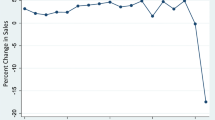Abstract
African American insurance companies, since the 1960s, have experienced a significant decline in their profitability and stature. Because of recent racial desegregation, which in an economic sense consists of white-controlled businesses and black consumers increasing their interaction with each other, black insurers are waging an increasingly difficult struggle to survive. It appears the only way African American insurance companies can counteract this disturbing trend is to voluntarily merge into one “mega” company. Such a maneuver would empower consolidated black insurers to better serve African American consumers and to make definitive inroads in cultivating the burgeoning African consumer market.
Similar content being viewed by others
Notes
See Jesse E. Gloster,North Carolina Mutual Life Insurance Company: Its Historical Development and Current Operations (New York: Arno Press, 1976; reprint of Ph.D. Dissertation, University of Pittsburgh, 1955); Robert C. Puth,Supreme Life: The History of a Negro Insurance Company (New York: Arno Press, 1976; reprint of Ph.D. Dissertation, Northwestern University, 1968); Walter B. Weare,Black Business in the New South: A Social History of the North Carolina Mutual Life Insurance Company (Urbana: University of Illinois Press, 1973); Alexa Benson Henderson,Atlanta Life Insurance Company: Guardian of Black Economic Dignity (Tuscaloosa: University of Alabama Press, 1990).
Merah S. Stewart,An Economic Detour: A History of Insurance in the Lives of Negroes (College Park, MD: McGrath Publishing Company, 1969. Originally published in 1940), pp. 37–38.
The Social and Economic Status of the Black Population in the United States: A Historical View, 1790–1978 (Washington, D.C.. Bureau Of The Census, 1979), pp. 120, 124.
Robert H. Kinzer and Edward Sagarin,The Negro In American Business: The Conflict Between Separatism and Integration (New York: Greenburg Publishers, 1950) pp. 100–101.
Robert E. Weems, Jr., “The Chicago Metropolitan Mutual Assurance Company: A Profile of a Black-Owned Enterprise,”Illinois HistoricalJ ournal 86 (Spring, 1993), pp. 15–26.
Minutes, Annual Meeting, Chicago Metropolitan Mutual Assurance Company (January 20, 1958), Chicago Metropolitan Assurance Company Archives, Chicago, Illinois.
Social and Economic Status of the Black Population, pp. 24–29; 120.
Interview, Weathers Y. Sykes (April 15, 1986). The now deceased Mr. Sykes formerly served as vice-president/administration of the Chicago Metropolitan Mutual Assurance Company. Before joining Chicago Met in September 1976, Mr. Sykes worked for several years at the Chicago-based Supreme Life Insurance Company.
Interviews, James S. Isbell (May 27, 1986); Cleland Brewer (April 16, 1986); Lynn Langston, Jr. (August 21, 1986). These men, all of whom had a long-time involvement with Chicago Metropolitan and other black firms, recounted how they, along with many of their agent colleagues, were actively wooed by mainstream companies.
Minutes, Annual Meeting, Chicago Metropolitan Mutual Assurance Company (January 20, 1964).
Linda P. Fletcher,The Negro in the Insurance Industry (Philadelphia: University of Pennsylvania Press, 1970), p. 129.
Minutes, Board of Directors Meeting, Chicago Metropolitan Mutual Assurance Company (November 22, 1961).
Interview, Jesse L. Moman (February 11, 1986). Mr. Moman, who served in a variety of administrative capacities within the company, coordinated the writing of a brief company history in 1977.
Ibid.
Pilot, 11 (Post-Convention Issue, 1963), pp. 4–5, Archives of the National Insurance Association, Chicago, Illinois.Pilot is the National Insurance Association’s official publication.
Pilot, 16 (August 1967), p. 3.
Andrew Brimmer, “The Negro in the National Economy,” in John P. Davis, ed.The American Negro Reference Book (Englewood Cliffs, NJ: Prentice-Hall, Inc., 1966), p. 309. Brimmer provided data for the top twenty black insurers. However, becauseBlack Enterprise, since 1991, has provided detailed data only for the top fifteen black insurers, I recalculated Brimmer’s sums to provide data for the top fifteen black insurers in 1962.
Ibid., pp. 309–310.
Ibid., p. 310.
Ibid, p. 332.
Ibid..
Ibid., 309;Black Enterprise, 23 (June 1993), p. 147.
Life Insurance Fact Book 1963, 97; 7993Life Insurance Fact Book Update, p.58.
Brimmer, “Negro in the National Economy,” p. 309;Black Enterprise, 23 (June, 1993), p. 151.
Brimmer, “Negro in the National Economy,” p. 309;1993 Life Insurance Fact Book Update, p. 46.
Brimmer, “Negro in the National Economy,” p. 318;Black Enterprise, 23 (June 1993), 151;1993 Life Insurance Fact Book, p. 36.
Ronald Alston, “North Carolina Mutual’s Policy for Growth,”Black Enterprise, 20 (June 1990), pp. 214–218.
Christopher C. Williams and Maynard Eaton, “Can Atlanta Life Be King of the Hill?”Black Enterprise, 18 (June 1988), pp. 251–254.
Solomon J. Herbert, “Reaching for the Stars,”Black Enterprise, 19 (June 1989), pp. 295–298.
Interview, Rumor L. Oden (July 9, 1986). Mr. Oden served as Chicago Metropolitan’s agency training director from 1973–1983.
“Insurance That Preys on the Poor,”Consumer Reports, 43 (November 1978), p. 661.
Best’s Review: Life/Health Insurance Edition, 94 (July 1993), p. 29.
About this article
Cite this article
Weems, R.E. A crumbling legacy: The decline of African American insurance companies in contemporary America. The Review of Black Political Economy 23, 25–37 (1994). https://doi.org/10.1007/BF02692733
Issue Date:
DOI: https://doi.org/10.1007/BF02692733




